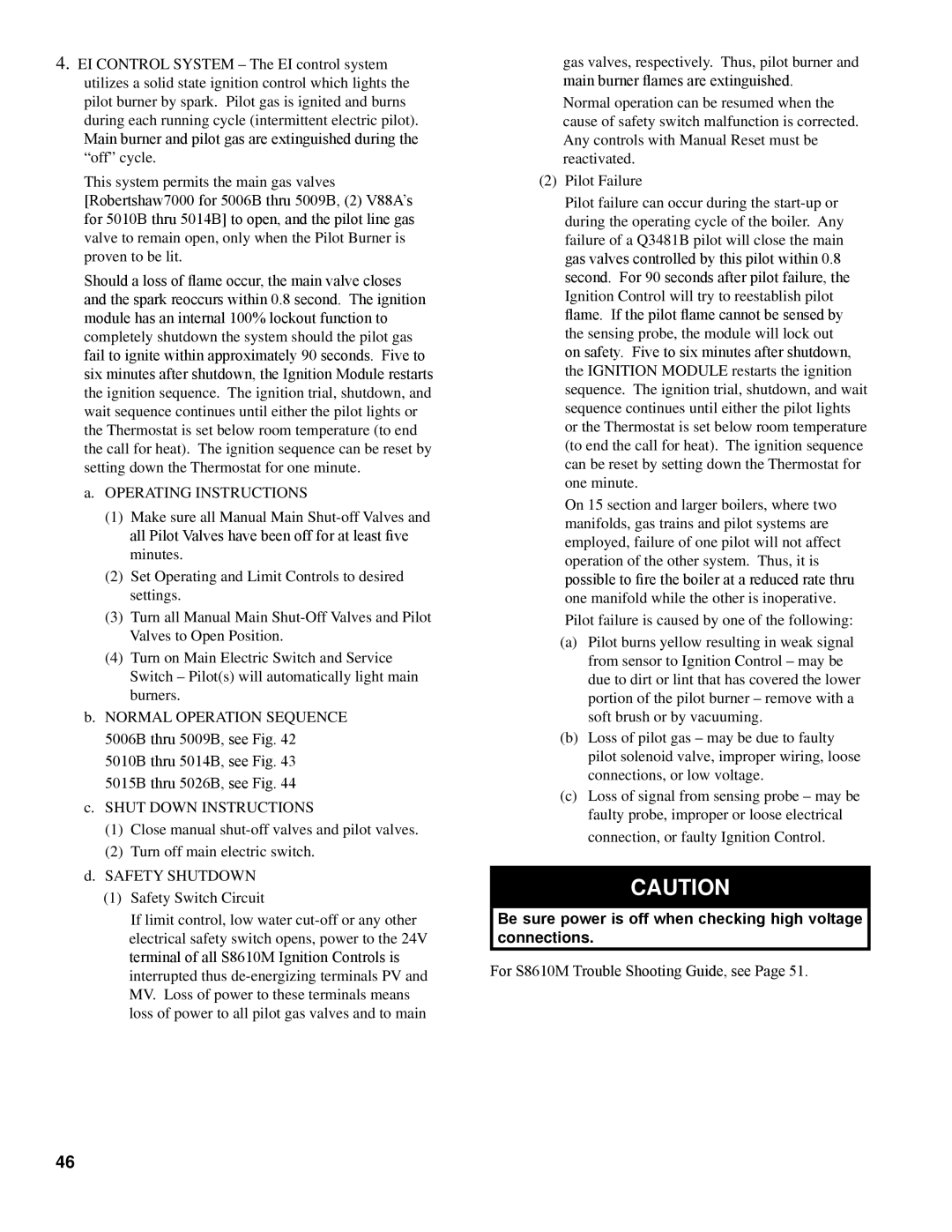
4.EI CONTROL SYSTEM – The EI control system utilizes a solid state ignition control which lights the pilot burner by spark. Pilot gas is ignited and burns during each running cycle (intermittent electric pilot).
Main burner and pilot gas are extinguished during the
“off” cycle.
This system permits the main gas valves [Robertshaw7000 for 5006B thru 5009B, (2) V88A’s for 5010B thru 5014B] to open, and the pilot line gas valve to remain open, only when the Pilot Burner is proven to be lit.
Should a loss of flame occur, the main valve closes and the spark reoccurs within 0.8 second. The ignition module has an internal 100% lockout function to completely shutdown the system should the pilot gas fail to ignite within approximately 90 seconds. Five to six minutes after shutdown, the Ignition Module restarts the ignition sequence. The ignition trial, shutdown, and wait sequence continues until either the pilot lights or the Thermostat is set below room temperature (to end the call for heat). The ignition sequence can be reset by setting down the Thermostat for one minute.
a.OPERATING INSTRUCTIONS
(1)Make sure all Manual Main
(2)Set Operating and Limit Controls to desired settings.
(3)Turn all Manual Main
(4)Turn on Main Electric Switch and Service Switch – Pilot(s) will automatically light main burners.
b.NORMAL OPERATION SEQUENCE
5006B thru 5009B, see Fig. 42
5010B thru 5014B, see Fig. 43
5015B thru 5026B, see Fig. 44
c.SHUT DOWN INSTRUCTIONS
(1)Close manual
(2)Turn off main electric switch.
d.SAFETY SHUTDOWN
(1)Safety Switch Circuit
If limit control, low water
gas valves, respectively. Thus, pilot burner and main burner flames are extinguished.
Normal operation can be resumed when the cause of safety switch malfunction is corrected. Any controls with Manual Reset must be reactivated.
(2)Pilot Failure
Pilot failure can occur during the
Ignition Control will try to reestablish pilot flame. If the pilot flame cannot be sensed by the sensing probe, the module will lock out on safety. Five to six minutes after shutdown, the IGNITION MODULE restarts the ignition sequence. The ignition trial, shutdown, and wait sequence continues until either the pilot lights or the Thermostat is set below room temperature (to end the call for heat). The ignition sequence can be reset by setting down the Thermostat for one minute.
On 15 section and larger boilers, where two manifolds, gas trains and pilot systems are employed, failure of one pilot will not affect operation of the other system. Thus, it is possible to fire the boiler at a reduced rate thru one manifold while the other is inoperative. Pilot failure is caused by one of the following:
(a)Pilot burns yellow resulting in weak signal from sensor to Ignition Control – may be due to dirt or lint that has covered the lower portion of the pilot burner – remove with a soft brush or by vacuuming.
(b)Loss of pilot gas – may be due to faulty pilot solenoid valve, improper wiring, loose connections, or low voltage.
(c)Loss of signal from sensing probe – may be faulty probe, improper or loose electrical connection, or faulty Ignition Control.
CAUTION
Be sure power is off when checking high voltage connections.
For S8610M Trouble Shooting Guide, see Page 51.
46
